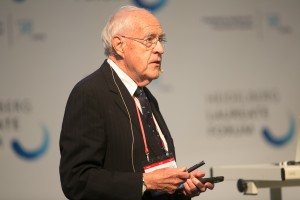Getting Personal with Computers
BLOG: Heidelberg Laureate Forum

Fred Brooks titled his address to the Heidelberg Laureate Forum “A Personal History of Computers.” The history is personal because Brooks has lived through much of it. In his student days he worked with the largest electromechanical computer ever made, then he helped build some of the first commercial electronic computers at IBM, and in 1964 he founded one of the earliest university departments of computer science.

His history of these events is personal in another sense as well: Brooks is not timid about offering his opinions on the importance (or otherwise) of various developments along the way. Which machine was the first programmable computer? What was the most important paper ever published in the field of computing? What innovation brought the biggest improvement in software productivity? Brooks has answers, and some of them may surprise you. (He says his own most important technical contribution was the eight-bit byte. The statement may be puzzling to younger people who grew up believing that eight bits per byte was an eternal law of nature.)
Finally, Brooks’s account is personal in that he gives us intimate glimpses of some of the key figures in the history of computing. Previously I had read of John Cocke’s work on optimizing compilers and reduced-instruction-set computers (RISC), but nowhere else have I ever heard him described as “a sweetie.”
This is a talk with charm as well as substance, and no summary can do it justice. The words I have written here are meant as an enticement: Go watch the video. It’s an hour well spent.

